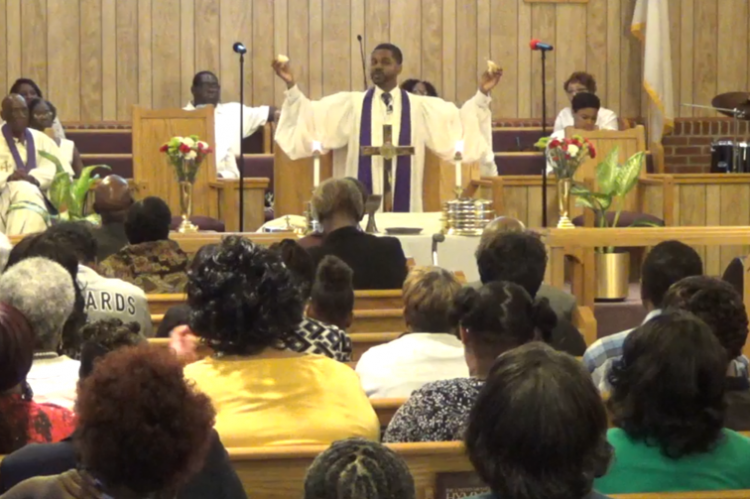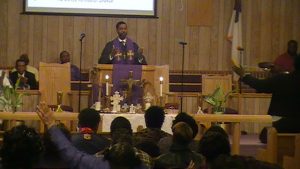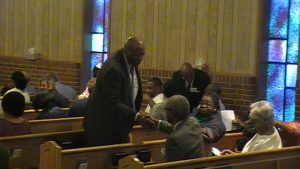Why Hospitality in the Black Church?
In contemporary American culture, we often hear how many congregations are in drastic decline and in some cases struggling to survive. This is especially true in my own context for ministry, the North Alabama Conference of The United Methodist Church. Because of declining membership and numerous congregations closing, the conference has emphasized the work of congregational development an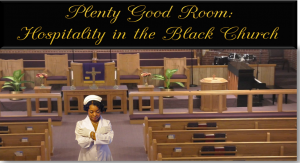 d new communities of faith in hopes to reverse some of these trends.
d new communities of faith in hopes to reverse some of these trends.
One area that I am most passionate about is our conference’s work with ethnic minority congregations, especially, our historically Black congregations. I have been fortunate in my own pastoral ministry to serve predominantly black churches that have overcome issues that often cause decline, such as, the danger of becoming too inwardly focused in ministry. In many ways, I have witnessed congregations “turn-around” from simply wanting to survive to exploring new opportunities for mission and ministry within their communities.
First, in choosing a project, I wanted to assist congregations in their process to reverse trends of declining membership and worship attendance. Secondly, I hoped to engage a topic that would also assist congregations in seeing no distinction between their church and the surrounding community. In short, I wanted to assist congregations in connecting with their communities in a deeper and meaningful way.
After initial research and conversation, the topic that seemed to most address these issues was the topic of Christian hospitality. In recent years, there has been a clarion call within the church to recapture the church’s ministry within the community by focusing on mission and outreach; however, many churches have failed to continuously evaluate and enhance their ministries and systems for welcome and hospitality within the space we call church. Many congregations affirm that they are welcoming and hospitable, but they do not engage in the critical conversations necssary to evaluate and enhance systems and methods that welcome new people.
In my initial research of Christian hospitality, I quickly realized that significant amounts of material had been written in regards to welcoming and hospitality ministries; however, much of the material did not consider people of various racial and ethnic cultures. Without these important and meaningful voices, the church is void of a wealth of knowledge and understanding as it relates to the topic of Christian hospitality, so I chose to focus my research by examining Christian hospitality through the lens of the Black Church.
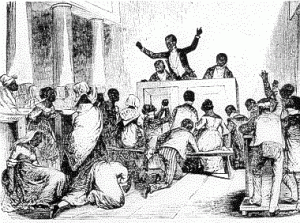
Slaves at Worship. American Slave Narrative: An Online Anthology (1998), University of Virginia, Charlottesville, VA. Accessed March 27, 2017. http://xroads.virginia.edu/~HYPER/JACOBS/hj-live2.htm.
Hospitality and creating a space for belonging have been hallmarks in the Black Church tradition, from the years of the secret prayer meetings held by slaves on plantations, to the mass meetings of the Civil Rights Movement.1 The Black Church has been crucial to how blacks understand community and belonging. Despite this heritage, one must acknowledge that the Black Church is not as central to the community as in generations past. In his book, New Wine New Wineskins: How African American Congregations Can Reach New Generations, F. Douglas Powe, Jr., acknowledges this shift in the cultural significance of the Black Church. He writes: “Some congregations will take offence and argue, ‘We are still missional focused. We feed the hungry and provide services for those in need.’ This is true. The challenge, however, is in valuing the identity of those being helped and not marginalizing them.”2
One should not assert that all black churches are inhospitable or unwilling to build genuine relationships with those to whom they minister. But it also seems to be the case that churches, including black congregations, often struggle to embrace those who are different than the members who worship there on a weekly basis. This takes different forms based on the ministry context of a local congregation. In some congregations, there may be a difference in social class, economic status, political affiliation, and even race and ethnicity. Despite its struggles in recent years, the Black Church holds within history the principles necessary to recapture a vibrant spirit of Christian hospitality.
Reflection on the Research Process
To contextualize the scope of research and analysis, my project focuses on New Beginnings United Methodist Church, a predominantly black congregation in Birmingham, Alabama. New Beginnings Church is the result of a merger that took place on January 1, 2013 among Douglasville United Methodist Church, Mt. Pleasant United Methodist Church, and Wright’s Chapel United Methodist Church. All three churches were predominantly black congregations founded in the early twentieth century within the North Alabama Conference of The United Methodist Church.
Although these congregations had tremendous success in growth throughout their years of ministry, in recent years, they had experienced significant decline in regards to both membership and financial resources. Hopeful that merging would provide a greater chance for both survival as well as opportunities to reach more people for Jesus Christ, these congregations took a risk and began to do ministry together. After a year of conversations, evaluating the state of ministry of the three congregations and exploring the possibilities of future growth, New Beginnings Church became a reality that is still thriving today.
The main tool for research and data collection was the development of a focus group comprised of members from the congregation. An invitation was extended to the church leadership team as well as recent visitors to worship services, to create diversity and balance. On average, 8-10 people participated in the focus group each week. The entire group was Black, the average age 45 years old, and there was an equal balance of men and women.
The focus group met for four hours each week, over the course of four weeks, to discuss the importance of hospitality in the Black Church tradition and how it relates to the ministry of New Beginnings Church and the North Birmingham community. A significant amount of time was given to exploring hospitality from a Biblical and theological perspective, reading scriptures, and exploring selected scholarly materials to spark in-depth reflection and discussion.
As leader of the focus group, I introduced a tool that I developed as an exercise to center our hearts and minds on the presence of God, but also to make ourselves aware of the daily opportunities we have to welcome those we encounter. With scripture serving as a foundation, “A Practice of Reclaiming Hospitality,” combines elements of Lectio Divina (an early Christian practice of scriptural reflection) and The Daily Examen (a traditional practice of self-examination to provide space to engage scripture and the world). The purpose of this practice was to reclaim hospitality as being transformational in all aspects of our lives.
In her book, Just Hospitality: God’s Welcome in a World of Difference, Letty M. Russell articulates that most people are comfortable with hospitality when limited to the familiar, but when we begin to explore the true dimensions of Christian hospitality, we tend to compartmentalize our responsibility as Christians.3 Some would argue that we live in an extremely individualistic society, and often we do not seek or recognize opportunities to engage others by sharing the love of God. Overall, “A Practice of Reclaiming Hospitality” helps to blur the barriers and dividing lines that often exist between us and those whom we encounter.
Christine D. Pohl offers a very critical question in her writing that provides a foundation for this practice of scriptural reflection and seeing the world: “If we use hospitality as a lens through which to examine our homes, churches, jobs, schools, health care, and politics, might we see them differently?”4 In most cases, our worldview is challenged and transformed when we begin to look deeply into our surroundings through the lens of hospitality. In short, this practice slows us down so that we can see God at work in our lives and in the lives of others.
At each session, participants received a new handout with a scripture that guided them through the practice of reclaiming hospitality. As group facilitator, I provided a brief introduction to the practice and emphasized the call upon each of our lives to seek and create opportunities to welcome and accept one another with the love of God. Participants were encouraged to write down their thoughts throughout the week as both a point of reference and source of reflection to share with the group at the following session.
Throughout the course of the sessions, the group seemed to appreciate these exercises and began to engage the idea of hospitality on a deeper and more meaningful level. Each week, participants shared powerful stories and moments in which they experienced the presence of God in their interactions with others. However, the exercises also demonstrated that everyone has room to grow in their walk with Christ, especially as it relates to welcoming and caring for others.
Major Findings and Their Implications
One of the most distinctive moments in our focus group was the discussion of the three major themes that the group felt were important to hospitality, especially in the Black Church tradition: (1) love of God and neighbor; (2) the importance of family and relationships; and (3) creating a place one could “call home.” One individual stated, “If we don’t have love, anything we place on the list will not and cannot be accomplished.” This statement gained the affirmation and support of the entire group.
I was reminded of the words of the Apostle Paul in his first letter to the Corinthian church, “If I speak in tongues of human beings and of angels but I don’t have love, I’m a clanging gong or a clashing cymbal.”5 It is easy for one to claim to be in ministry to welcome all persons, but it is much more difficult to truly fulfill this calling. The very fact that most congregations consist of people who all look the same is evidence that there are many opportunities for churches to engage in ministry beyond their current contexts.
Most would agree that the entire Christian faith and the Church is grounded in the notion and idea of love. In modeling their ministry after Jesus Christ, the apostles sought to breakdown socioeconomic barriers that prevented people from loving God and loving one another. The call rings true today—to invite all to live in community, where all are valued and loved, because God created us all, and God loves us all.
Another major theme of hospitality, one that is especially important within the life of the Black Church, is valuing all people as part of the family of God. On numerous occasions, I heard participants in the focus group mention feeling a part of a family. Of course, we can draw from the Biblical and theological tradition of belonging to the family of God; however, it also has cultural connections as it relates to the heritage of Black people. In her book, African American Christian Worship, Melva Wilson Costen affirms that one of the strongest forces in traditional African life that continues among Blacks is a deep sense of kinship or relatedness.6
It is recorded in historical accounts that many families were torn apart because of the American slave trade, and it was typical that these enslaved Africans would create new families for identity and belonging. Costen writes, “In spite of separation and transition through slavery, this concept continued throughout Black culture, especially where two or three where gathered in worship or at work.”7
Another theme that the group and I felt was important to hospitality, especially in the Black Church, is the idea of church as “home.” As the focus group ended, one of the participants, who had been a life-long member of one of the former congregations, stated: “The church is just like home to me. I feel like I’m at home here. There’s so much love here and I feel like this is exactly where I need to be.” Hospitality has everything to do with how people feel—do people feel comfortable and “at home” physically, psychologically, and spiritually? Creating a welcoming and hospitable home involves everything from the appearance of the space to the very heart of the people in the congregation.
For someone to feel at home, they must be engaged by the host, acknowledging their worth and meeting them at their point of need, physically, emotionally, and spiritually. Lucien Richard further highlights the idea of “home” as being more than simply a place. He affirms that home is a state of being when he writes, “The term home refers to affective elements. Less simply a space than a place of intensity, of emotional energy, ‘home is where the heart is.’”8
Next Steps for This Project
Overall, I believe the project goals were accomplished through its implementation. The focus group participants seemed to not only engage the idea of hospitality from a Biblical and theological perspective, but they could relate the discussions to their own lives and the life of the church. The tool developed especially for the focus group, “A Practice for Reclaiming Hospitality,” enabled participants to study and reflect on the Biblical text, as well as consider, the roles everyone plays in welcoming others.
The themes and principles essential to the Black Church, and especially to New Beginnings Church (love of God and neighbor, family and relationships, and creating a home-like atmosphere), are proof that participants could identify and recapture the spirit of Christian hospitality. Not only were they able to identify these themes and principles, but most of the participants immediately began thinking of ways to engage the congregation to enhance these within the life of the church. Because of this project, we now have individuals and teams of people who are working to demonstrate and model Christian hospitality while encouraging others to do the same.
There were also missed opportunities in the implementation of this project that I believe will provide space for continued research and development. In studying the statistical data and demographics of the church and community, it would have been powerful to engage more of the voices that are currently underrepresented in the life of the congregation. The two groups that our congregation struggles to welcome most are those who are under the age of 40, and those who are from lower socioeconomic backgrounds. The scope of the project was limited because most of those who were engaged in discussions were older and considered to be working or retired middle-class professionals. To truly gain a fuller picture and understand the systems of hospitality at work at New Beginnings Church, continued research on younger generations and the poor and marginalized will be vital.
Another missed opportunity and an area for continued research involves the North Birmingham community itself. It would have been helpful to take a walking tour of the neighborhood or go to places in the neighborhood where people gather, such as local restaurants, schools, and stores, to have informal conversations outside of the church. This would have allowed focus group participants the opportunity to examine how the community understands hospitality and creating spaces for belonging. The North Birmingham community is a highly populated and busy area of the city and it would have been interesting to ask residents their thoughts and opinions on the New Beginnings congregation.
The scope of this project focused on New Beginnings Church, a healthy and thriving congregation, however, another area for continued research would be the comparison between a healthy congregation and one that is in decline. We tried to capture some of this compassion in our discussions of the three former congregations, but much of what was said was clouded by the new things happening at New Beginnings. The major focus for continued research would be if some of the same themes and principles would be identified as being important to every church’s understanding of hospitality, especially in the Black Church tradition. If so, how does a congregation that is in decline interpret and understand these themes? Are there other themes that are more important in other contexts?
I believe hospitality is contextual and each context has its own unique identity and understanding of what it means to welcome people and create space to belong. This project offers some practical steps a congregation can use to continuously evaluate their own ministries for welcoming people: developing a focus group (or similar team that can engage Christian hospitality), understanding the context of the local church, and exploring the culture of community.
This project was not only helpful to the New Beginnings Church, but to my own ministry as a minister of the gospel of Jesus Christ. As a pastor, it is important to not only minister to those who are present within the life of the congregation, but also to the community and those who are not there yet. It begins with seeing who is missing, and then asking ourselves critical questions as to why these persons are missing from the fellowship of believers that Christ has opened to all persons. It is in that critical reflection that we begin to challenge ourselves to go beyond our shallow interactions with people, meeting them where they are in the hope of building an authentic relationship of mutual care and love.
Most importantly, hospitality cannot be disconnected from the nature of the church itself. One of the key themes of Jesus’ ministry is his ability to serve the needs of others, which is the embodiment of hospitality. In Mark’s gospel, Jesus proclaims, “Even the Son of Man came not to be served, but to serve others and to give his life as a ransom of many.”9 Jesus demonstrates that to be one of his followers, one must seek to serve the needs of others. Not simply for the sake of serving the world, but for the sake of serving God.
In his book, Walking with Nehemiah: Your Community is Your Congregation, Joseph W. Daniels Jr. affirms a concept that I believe keeps the church’s eye to those who are not there yet. He writes: “We must behave as if the community is our congregation. The streets are our sanctuary. The back alleys are our altars of blessing. Farmlands are our fields of opportunity. New housing developments become our narthex through which new life is ushered. And strip malls of suburbia become creative places for leading people to salvation.”10 These words have continued to challenge and broaden my view of ministry and hospitality as I seek to serve as a pastor. These opportunities for hospitality and welcome are around us each day, but we must “have eyes to see and ears to hear.”
I firmly believe that I have a calling from God on my life to remind the church of this reality and to dedicate my life in helping reclaim the ministry of hospitality within the Black Church context. This project has provided an avenue for continued research and study, but most of all, a platform to fully participate in the ministry of welcoming all people on a larger scale. The church has a phenomenal opportunity to minister to the hearts and lives of people who are in desperate need of God’s love and grace, and my prayer is to be an instrument in service to God.
Footnotes
1 For present purposes, the “Black Church” refers to any Christian congregation predominately populated by Blacks, including those that are part of denominational traditions that began among Whites. The Black Church is a social institution which started on the African continent, survived slavery, and became the center of black social life following the American Civil War.
2 F. Douglas Powe, Jr., New Wine New Wineskins: How African American Congregations Can Reach New Generations (Nashville, TN: Abingdon Press, 2012), 35.
3 Letty M. Russell, Just Hospitality: God’s Welcome in a World of Difference (Louisville, KY: Westminster John Knox Press, 2009), 80.
4 Christine D. Pohl, Making Room: Recovering Hospitality as a Christian Tradition Grand Rapids, MI: Wm. B Eerdmans Publishing Co., 1999), 150.
5 I Cor. 13:1 (CEB)
6 Melva Wilson Costen, African American Christian Worship (Nashville, TN: Abington Press, 1993), 21.
7 Ibid., 22.
8 Lucien Richard, Living the Hospitality of God (Mahwah, NJ: Paulist Press, 2000), 8.
9 Mk. 10:45 (CEB)
10 Joseph W. Daniels, Jr., Walking with Nehemiah: Your Community Is Your Congregation (Nashville, TN: Abingdon Press, 2014), 51.
Save
